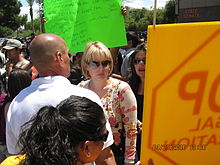Kyrsten Sinema
Kyrsten Lea Sinema (/ˈkɪərstən ˈsɪnəmə/ KEER-stən SIN-ə-mə; born July 12, 1976)[1] is an American politician and former social worker who served from 2019 to 2025 as a United States senator from Arizona.
She began her political career in the Arizona Green Party and rose to prominence for her progressive advocacy, supporting causes such as LGBT rights and opposing the war on terror.
[23] During a February 15, 2003, protest in Patriots Square Park in Phoenix, a group led by Sinema distributed flyers portraying a U.S. service member as a skeleton "inflicting 'U.S.
Sinema chaired a coalition called Protect Arizona's Freedom, which defeated Ward Connerly's goal to place an initiative on the state ballot that would eliminate racial-preference programs.
[57][58] In June 2009, Sinema was one of 32 state legislators appointed by President Barack Obama to the White House Health Reform Task Force, which helped shape the Affordable Care Act.
Although Sinema was not required to resign her State Senate seat under Arizona's resign-to-run laws (since she was in the final year of her term), she did so on the same day that she announced her candidacy.
Her opponents, state Senator David Schapira and former Arizona Democratic Party chairman Andrei Cherny, a former speechwriter in the Clinton administration, each finished with less than 30 percent of the vote.
[83] Following her election to Congress, Sinema shifted toward the political center, joining the conservative Democratic Blue Dog Coalition and the bipartisan Problem Solvers Caucus and amassing a "reliably moderate-Democratic" voting record.
[87] On September 28, 2017, Sinema officially announced her candidacy for the Class I United States Senate seat held by Republican incumbent Jeff Flake, who declined to seek reelection the next month.
In March 2018, Sinema donated to charity $33,800 in campaign contributions she had received from Ed Buck, a prominent Democratic donor who came under scrutiny after a homeless escort died of a drug overdose at his California home in 2017.
[94] She had previously donated to charity $53,400 in campaign contributions from people with ties to Backpage, a website that was seized by the United States Department of Justice after it was accused of knowingly accepting ads for sex with underage girls.
[95][96] Federal Election Commission filings released in April 2018 showed Sinema had raised over $8.2 million, more than the three leading Republican primary contenders combined.
Their resignation letter accused her of "answering to big donors rather than your own people" and criticized her opposition to key Democratic Party issues, such as abolishing the filibuster and aspects of Biden's Build Back Better Plan.
[125] Sinema was the only U.S. elected official to attend the 2022 Bilderberg Conference, an annual private gathering of the European and North American political and business elite.
[130][131][132][133] Late in 2023, Sinema was brought in as the medium between liberal Democrat Chris Murphy of Connecticut and conservative Republican James Lankford of Oklahoma to negotiate a bill to handle the Mexico–United States border crisis.
[163] The bill would "expand the list of statutory aggravating factors in death penalty determinations" to include the killing or targeting of a law enforcement officer, first responder, or firefighter.
[175][176][177] On February 12, 2021, Sinema became the second Democratic senator after Joe Manchin to announce her opposition to including a $15/hour minimum wage as part of a COVID-19 relief bill.
[178] On March 5, 2021, Sinema voted against an increase of the federal minimum wage to $15 an hour, proposed by Senator Bernie Sanders as part of the American Rescue Plan Act of 2021.
According to Josh Lederman of The Hill, "The group's mission statement at the time called military action 'an inappropriate response to terrorism' and advocated for using the legal system—not violence—to bring Osama bin Laden and others to justice.
One flyer referred to "Bush and his fascist, imperialist war", saying, "Government is slavery", and describing laws as "cobwebs for the rich and chains of steel for the poor".
On October 8, 2021, Jacobin reported: Early last month, a corporate front group called Center Forward purchased $600,000 worth of television and radio ads promoting Sinema in Arizona.
As we reported, Center Forward has been heavily bankrolled by Pharmaceutical Research and Manufacturers of America (PhRMA), the powerful Washington drug lobby.
Two Center Forward board members lobby for PhRMA, as well as drugmakers Amgen, Bayer, Gilead Sciences, Eli Lilly, Merck, Novartis, and Sanofi.
[214][215] KHN reported: "For the 2019–20 election cycle through March, political action committees run by employees of drug companies and their trade groups gave her $98,500 in campaign funds, Kaiser Health News' Pharma Cash to Congress database shows.
"[214] Sinema's haul was "twice that of Sen. Susan Collins of Maine, considered one of the most vulnerable Republicans in November, and approached that of fellow Democrat Steny Hoyer, the powerful House majority leader from Maryland.
"[216] Senator Bernie Sanders indirectly called her out, saying: "Take a hard look at those people who are opposed to strong legislation to lower the cost of prescription drugs, and take a look at their campaign-finance reports.
[221] In 2013, Sinema co-sponsored Rep. Sean Patrick Maloney's letter, which opposed Saudi Arabia for "the use of torture and capital punishment against the LGBTQ community".
[233] In June 2013, Sinema became one of 29 original cosponsors of the bipartisan LIBERT-E (Limiting Internet and Blanket Electronic Review of Telecommunications and Email) Act, along with Representative Justin Amash.
[234] In July 2013, Sinema joined a bipartisan majority and voted against an amendment to a defense appropriations bill (offered by Amash) to prohibit the NSA from monitoring and recording details of U.S. citizens' telecommunications without a warrant.
[242] In 2019, Sinema was the sole Senate Democrat not to co-sponsor the Save the Internet Act, which would restore Obama-era regulations preventing ISPs from throttling consumers' website traffic.




